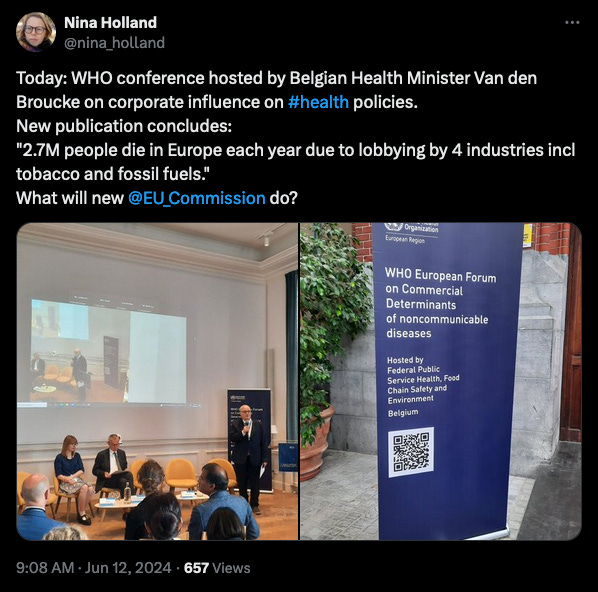The WHO European Region published a new report today, written mostly by British ‘public health’ academics. It is quite revealing. For example...
This requires, at a minimum, that governments recognize that the primary interest of all major corporations is profit and, hence, regardless of the product they sell, their interests do not align with either public health or the broader public interest. Any policy that could impact their sales and profits is therefore a threat, and they should play no role in the development of that policy. Similarly, governments must also recognize the now overwhelming evidence (see also chapters 4, 6 and 7) that HHIs [‘health-harming industries’] engage in the same political and scientific practices as tobacco companies and that voluntary or multistakeholder partnership approaches do not work where conflicts of interest exist. Instead, they must regulate other HHIs [‘health-harming industries’], their products and practices, as they do tobacco.
That’s just one paragraph, but there’s a lot it in.
Firstly, they are clearly not just opposed to ‘health-harming industries’ but to private industry and the free market in general.
Secondly, they want to exclude all industries from the policy-making process, as already happens with the tobacco industry.
Thirdly, they want to regulate all ‘health-harming industries’ in the same way as they regulate tobacco. These industries include alcohol, food and fossil fuels, but the report also mentions pharmaceuticals, infant formula, gambling, firearms, healthcare (!) and sugary drinks. As the quote above makes clear, they think that all private industry damages health in some way.
This is all there in black and white and there is much more of the same in the report. This is not scaremongering or the slippery slope fallacy. It is in an official WHO document.
When people show you who they are, believe them.
I have written about this for The Critic…
If this sounds to you like Bolshie talk, you might be onto something. It is further confirmation that the modern “public health” movement is an arm of the hard left presented as an arm of medicine. It would be tempting to tell the authors to stay in their lane, but anti-capitalist nanny statism is their lane. For over a decade, such academics, mostly from Britain and Australia, have been pumping out studies about the “commercial determinants of health” and the “corporate political activity” of “unhealthy commodity industries”. The new WHO report is a sort of greatest hits collection. Last year they published a whole series of articles in the Lancet in which they claimed that there is “growing evidence that neoliberalism has been damaging to health” and called for “a normative shift away from harmful consumptogenic systems”.
Half-baked Marxist rhetoric has been rife in the social sciences for decades, but these people have a vaguely coherent point to make and are pursuing a serious, if terrifying, agenda. Since they do not believe in human agency, they assume that people only make “unhealthy choices”, such as eating processed ham, because the system that controls them has been rigged by big corporations. They say in today’s report that “consumers do not have capacity (time or resources) to make the ‘right’ choice”. Fortunately, public health academics know what the right choice is and could impose it on a grateful population if it were not for the pesky free market. Hence their rage against capitalism, which extends to suspicion of intellectual property, international trade, share buybacks, impact assessments (because they allow businesses to engage with policy-makers) and even the EU single market.
Further to what I say in the article, I’d add that it is to the UK’s shame that so many of the authors of this report are British. They include quackademics that I have been making fun of for years, such as Anna Gilmore, Mark Petticrew and May van Schalkwyk. Between them, they constitute a small clique of talentless, fanatics and/or grifting social scientists who have constructed a world of unreality for themselves by publishing endless low quality journal articles which they and their colleagues then reference and self-reference. It is profoundly depressing that they are now dangling the corpse of the WHO - which was once a great institution - on pieces of string.
One of their favourite tropes - mentioned in the paragraph I’ve quoted from their WHO report above - is that ‘health-harming industries’ “engage in the same political and scientific practices as tobacco companies”. They have produced dozens of articles making this claim, but it rests on businesses engaging in mundane political ‘strategies’ such as lobbying politicians, building coalitions, commissioning research and occasionally threatening legal action. Not only are these ‘tactics’ used by all sorts of industries, they are also used by civil society organisations when they engage in political activity, including public health campaigners. There is very little in the ‘tobacco playbook’ that public health campaigners do not do. The only difference is that they use different names for it. Lobbying, for example, is described as ‘advocacy’ when public health actors do it but as ‘interference’ when industry does it.
There is a huge amount of projection here. The relevant phenomenon is not that the infant formula industry uses many of the same ‘tactics’ as the tobacco industry, but that the public health racket is trying to do exactly the same thing to a multitude of industries as it did to tobacco (despite denying for decades that there is a slippery slope).
What is this, for example, but sheer projection?
We propose that UCI [unhealthy commodity industry] framing is nested within an overarching and simplistic dichotomy: corporate intentions, values and actions are ‘good’; those of the proponents of industry-opposed policies are questionable or ‘bad.’
… corporations position themselves as representing and speaking for the public interest while they position those proposing the policy as damaging the public interest.
A more subtle but crucial weakness is the caricaturised accounts of social life offered by corporate actors, where everything they represent and do is good and everything opponents represent and do are bad, for example: proposed policy is utterly bad, has no redeeming features and will have catastrophic consequences; only corporations (not the public health community) has the public’s interest at heart and the expertise to address the health problems.
By focusing on superficial similarities between Big Tobacco and Big Food (or whatever) the intention is to (a) encourage policy-makers to regulate them both in the same way, and (b) to deflect attention from the fact that the slippery slope has become a runaway train. Remarkably, they seem to be getting away with it and the the Zombie WHO is now officially on board.
PS.
The report has been covered in the media with the dubious claim that four products - tobacco, alcohol, processed food and fossil fuels - are responsible for 2.7 million deaths in Europe every year. (That’s more than four products really, isn’t it?) The authors don’t provide any evidence for the figure and I assume it was rectally sourced, but it swiftly became ‘four industries kill 2.7 million people a year’ and then, at the launch event for the report, ‘lobbying kills 2.7 million people a year’.
It feels futile to try to resist such a tidal wave of stupidity and mendacity, but several newspapers, such as the Daily Mail, included a seditious quote from my good self.






Also note that those 2.7 million deaths in "Europe" refer to the WHO's "European region", which takes in Russia, Ukraine, the Caucasus, and Central Asia, all the way to China's borders.
You played your part in getting us to this point, Christopher Snowden! You supported the insane response to Covid. You wanted harsher restrictions, didn't you?